Can Pigeons Eat Wheat?
Pigeons are not picky eaters; they don’t put up a fuss when eating, but they are sensitive to certain foods.
Maize, oats, and barley are some favorites among most birds, but can pigeons eat wheat?
To put it simply, wheat is both fully safe and good for pigeons to eat. The majority of dangers related to feeding wheat to pigeons come from bad feeding practices such as overfeeding, a lack of diversity, and dehydration.
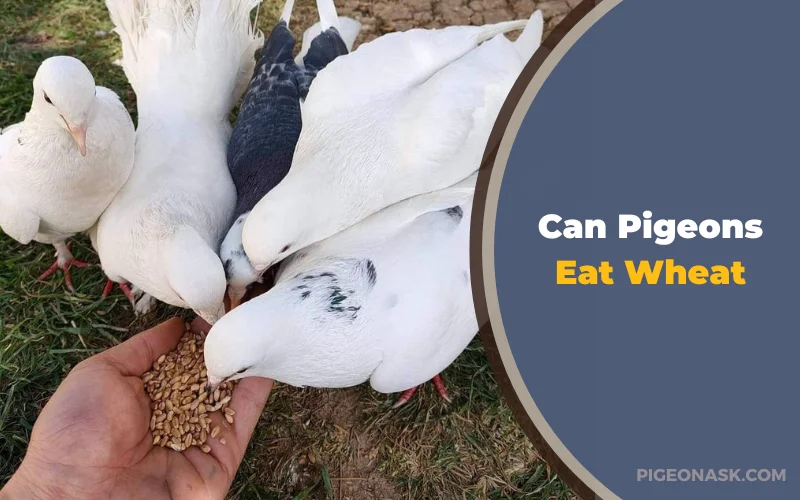
In the following, we’ll break down all the do’s and don’ts of giving your pigeons wheat. First, let’s look at the many benefits of this common cereal crop.
Looking for more articles about pigeon food:
Is Wheat Good for Pigeons?
Pigeons like a wide variety of foods, from berries to live worms, in their diet. Grain products make up a sizable portion of their diet. Dry foods that pigeons like eating include grains, peas, and the seeds of many fruits and vegetables.
Wheat is the most popular kind of cereal crop. For this reason, pigeons are able to consume them. Since cereals are essential to the pigeon diet, they obviously come with benefits alongside fulfilling this dietary need.
So, yes, wheat is a good choice when it comes to feeding pigeons. However, it should not be consumed regularly as their only food source.
Can Pigeons Safely Consume Wheat as Part of Their Diet?
Cereal crops are a vital part of a pigeon’s diet, which is also common in most birds. Birds, including pigeons, may safely eat a variety of coarsely textured, dry foods, such as wheat, maize, rice, oats and even cracked corn.
Pigeons’ gizzards enable them to digest them. Most birds have this specialized organ in their digestive tract, which aids in breaking down and absorbing difficult meals like any other food.
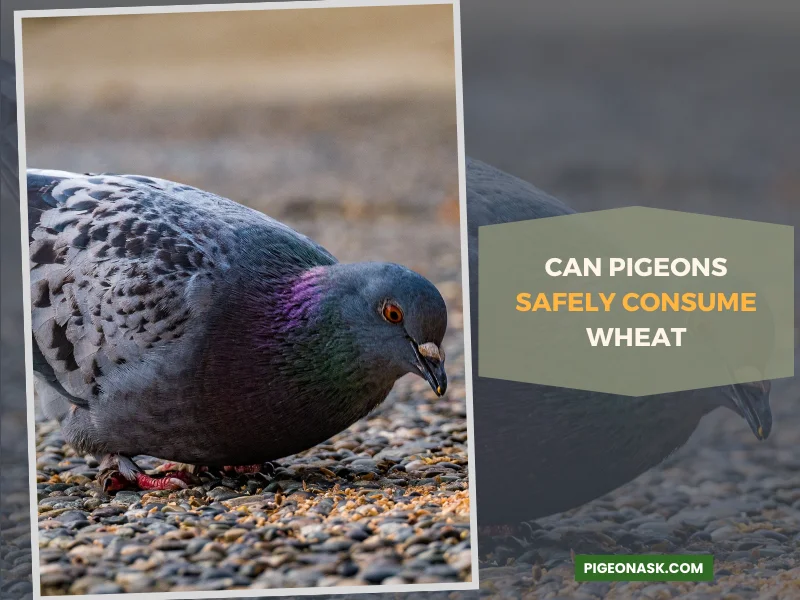
It should be noted that pigeons do not like soft wheat. Softened wheat requires more chewing from pigeons, which they dislike.
In most cases, pigeons would prefer to starve than chew on soft wheat. So, dry and roughly textured wheat is preferable for them to pick at with their beaks and be ground by their gizzards.
See our in-depth “Pigeon Foods and Diet” article to learn what these urban birds eat. We cover their dietary habits and nutrition.
Is Wheat a Nutritional Food Source for Pigeons?
Wheat can be an exceptional addition to a pigeon’s diet when it is fed to them appropriately. Small amounts of dry wheat given to a pigeon semi-regularly can do wonders for the nutrition in its body.
In general, wheat is packed with carbohydrates, fiber, and protein. These make up the essential building blocks in a pigeon’s diet.
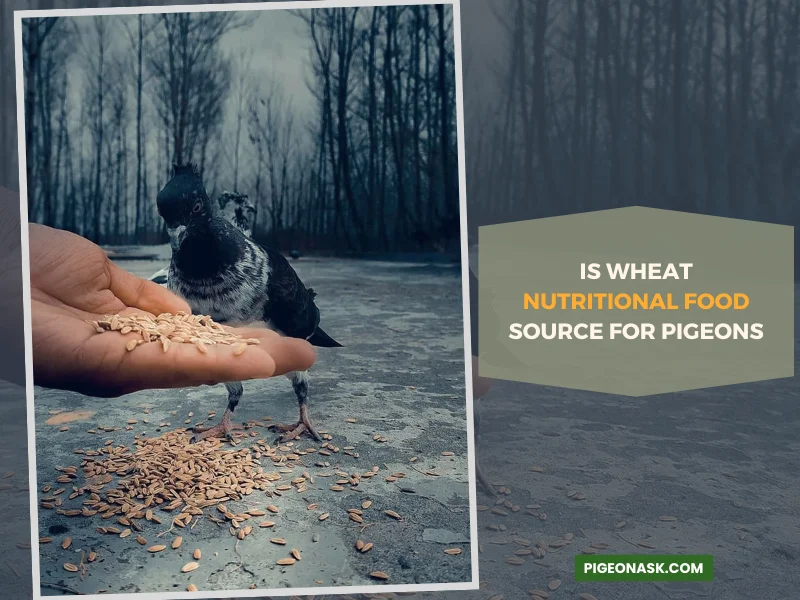
Protein is utilized to increase muscle mass, fiber is needed to move items along the intestine, and carbs are used for metabolism and energy renewal.
As a cereal grain, wheat also has advantageous elements, including lipids, minerals, Vitamin B, and Vitamin C.
However, given the fat content in wheat, feeding wheat to pigeons too much or too regularly can spike their fat levels. This will eventually lead them to become unhealthy and exposed to various health risks.
Are There Any Risks Associated with Feeding Pigeons Wheat?
Pigeons are sensitive birds, but they are smart enough to eat their fill and not overfeed themselves. Regardless, it should still be a priority for all pigeon owners to understand the risks of letting pigeons eat wheat. Here are some of the most common risks –
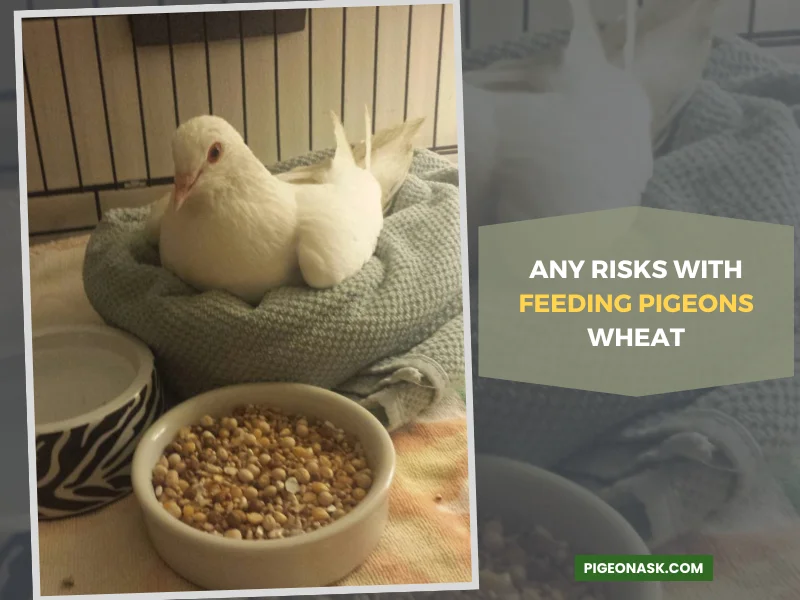
Choking
As much as pigeons enjoy crunchy foods, dry cereal crops like wheat can get stuck in their throats while eating.
When feeding, pigeons can get overstimulated and rush while eating. This is more common in homes where there are multiple pigeons living together and eating the same food.
The hurrying causes the food to get stuck in their throats and cause choking.
Plus, the dryness of the wheat can also cause choking. Because of this, it’s recommended to keep water nearby so that the pigeons can drink in between.
Processed Wheat
Unless you’re growing your own wheat from scratch, wheat bought from convenience stores may be processed. For pets, especially pet birds, processed foods are a strict red line as they can cause serious harm to their bodies.
Preservatives and additives are loaded inside processed foods. Even foods that seem harmless, like wheat, can have colorants, flavor-enhancing ingredients, and other harmful chemicals.
For humans, these chemicals do not pose that much of a short-term threat. But for birds, the small concentration of artificial ingredients is huge to them, which can impose risks on their health.
To avoid poisoning your pigeons, it’s best to opt for fresh wheat from the farmer’s market.
Loss of Appetite
All pets can experience a loss of appetite from time to time. This can be due to sickness, poor adjustability to a new environment, emotional detachment issues, and more.
A lack of balanced dietary habits is one of the leading causes of this problem.
Pigeons, as we know, have a diet with many varieties of food. While cereal crops are a part of their diet, frequently feeding them wheat can cause them to grow tired of it and eventually stop eating altogether.
This doesn’t mean they’re picky eaters, but rather, they need variety in their feeding routine so that they have a balance of nutrients in their bodies. So, alongside wheat, pigeons should also be eating berries, peas, worms, insects, and more.
Pest Consumption
Wheat is a cereal crop, which means it can be at risk of being contaminated by pests. Many small insects, such as stem sawflies, wireworms, wheat aphids, and wheat mites’ nest in wheat and leave harmful bacteria.
These are not only harmful to humans but animals as well. It is possible to have wheat sterilized and free from pests before giving them to pigeons. However, it is necessary to give them a small portion as large quantities of wheat might be left uneaten, which will then collect insects as time passes.
This may later be eaten by the pigeons and cause them to fall sick. Although store-bought wheat is safe from this issue, it’s still best to avoid it as it is processed. Instead, get fresh wheat from a trusted farm and sterilize it by washing it and then having it dried.
Malnutrition
While it’s possible for pigeons to get tired of eating the same food just like humans, some may build an unhealthy habit of being attached to a specific food.
Pigeons love the crunchiness of dry wheat and the fullness it brings them after they are done eating it. This may make them prefer it over other foods like berries or insects.
Over time, the fat content from the wheat makes the pigeons feel weak and tired, which eventually leads to premature death.
Again, this is an issue that usually stems from a lack of a stable feeding routine and dietary rotations.
How Do You Feed Pigeons Wheat?
Unlike bird feed, you cannot just throw some wheat in front of pigeons and call it a day. Wheat needs to be prepared and served carefully when giving it to pigeons in order to avoid health risks.
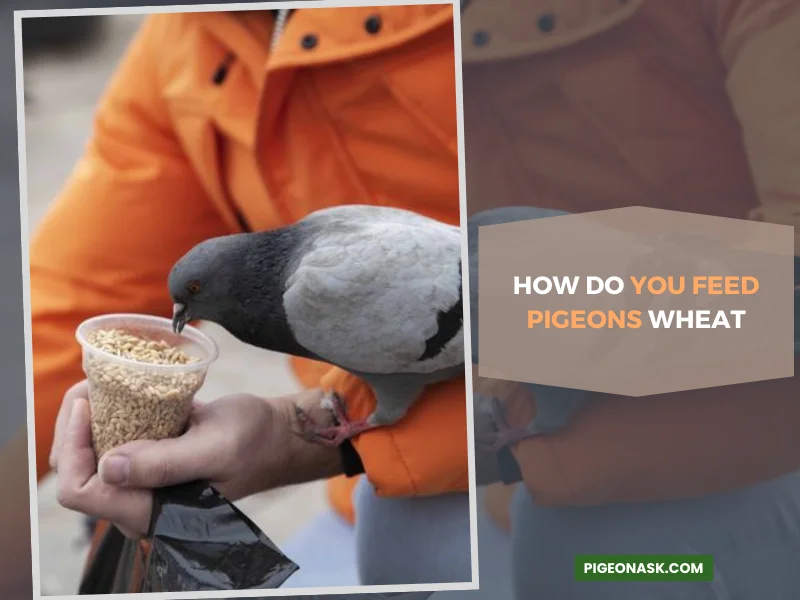
Here’s a step-by-step guide on properly feeding pigeons wheat –
Step One – Maintain Proper Hygiene
Make sure the wheat you’re using is free from any impurities. It’s recommended to have the grains washed as you do with rice and then leave them out to dry. If they’re soft, then you can toast them in a dry pan without using any oil.
When serving, use a clean and appropriately sized container or dish.
Step Two – Control the Proportion
For a group of pigeons, you will not need more than a handful of wheat. And if you’re giving a pigeon wheat for the first time, it’s best to keep the portion size modest.
Give them a little bit of the grains, and if they show eagerness while eating, then you can slightly increase the portion size.
Also, don’t dump the wheat into a pile in front of them. Spread out the wheat so that they can pick at the grains.
Step Three – Choose a Clean and Quiet Place
A rowdy and over-stimulating environment might cause your pigeons to choke on the wheat. So, it’s best to feed them wheat when they are calm and not distracted.
If you have to, then separate each pigeon from their group and feed them individually. Alternatively, you can separate them into smaller groups or pairs so that they do not fight over the food.
Step Four – Monitor
It’s good to monitor your pigeons as they eat, especially if it’s their first time trying out a new food. You do not have to wait for them to finish the food; just spend a few minutes observing if they are eating or not.
Make sure to keep a full container of water nearby and also other food options such as fruits or insects.
Can Pigeons Eat Wheat Bread?
To put it briefly, yes, pigeons can eat wheat bread. However, this is only allowed occasionally when whole wheat is not available.
Bread does not have the proper nutrients that a pigeon’s diet requires. Although it might be high in carbohydrates, it lacks vital nutrients such as minerals, protein, and vitamins.
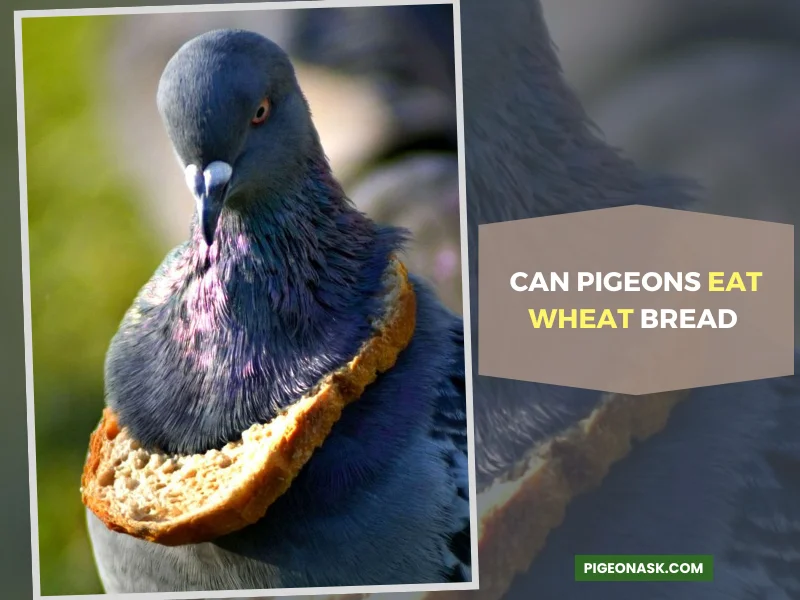
You may break off a piece of wheat bread and give it to your pigeons as a treat every now and then. But, be cautious in not making it a habit or substituting wheat bread for actual fresh wheat.
How Much Wheat Should a Pigeon Be Fed Per Day?
Roughly an ounce of wheat is enough for a pigeon for a day. But this should not be the only source of food they get throughout the day.
Alongside an ounce of wheat, pigeons should also be getting a few seeds, insects, berries, and a small chunk of a vegetable. Water is also essential for their digestion, so always keep their water containers full.
You can also choose to feed them wheat a few days out of the week while keeping the other days for different grains, such as maize.
Conclusion
To sum up, the answer to the question ‘Can Pigeons Eat Wheat’ is yes. Wheat is a great source of fiber for pigeons and keeps them full for a long time. It also helps to fulfill their dietary needs for cereal crops.
However, how much and how frequently wheat should be given to pigeons needs to be controlled. Be careful to give pigeons only as much as they can eat and add variety to what you feed them daily.
References:
- https://www.news24.com/news24/feeding-pigeons-20160513
- https://a-z-animals.com/blog/what-do-pigeons-eat/
- https://www.rspb.org.uk/birds-and-wildlife/advice/how-you-can-help-birds/feeding-birds/safe-food-for-birds/household-scraps-for-birds/
